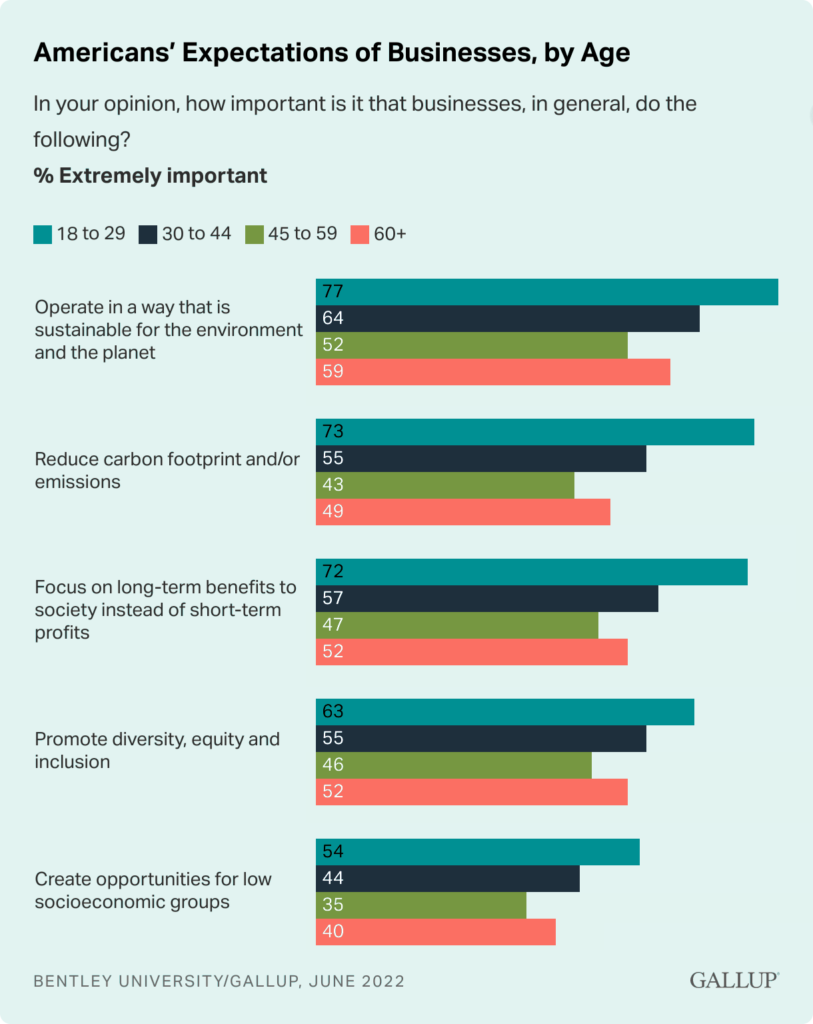In an interview with the founders of Ben & Jerry’s published in The New York Times, Ben Cohen states something radical and true: “Businesses are the most powerful force in our society.”
For better or worse, we live in a capitalistic society. Businesses big and small have incredible influence over our lives – as employers, suppliers of goods and services, and as corporate citizens. It’s both curious and disappointing that many businesses don’t take this powerful role more seriously beyond profits.
But things are changing. Consumers are demanding more from the brands and organizations they choose to engage with: Compassion and empathy for their customers and the world around us – to be human-centered vs. corporate-centered. To stand for something more than making money, rather to make our lives better, to treat us as they’d want to be treated, and to be who they say they are. In fact, 72 percent of 18 to 29 year olds and 57 percent of 30 to 44 year olds say it’s extremely important for businesses to focus on long-term benefits to society instead of short-term profits.

And this got us thinking: What does it take for a business to be a net force for good – promoting well-being, enabling a better way, or reducing harm and suffering — in our lives and our world?
A new framework
Enter Brand Integrity: The alignment of what you* stand for as a brand and an organization (your motivation), how you run your business (your methods), and how you communicate and connect with your customers (your marketing). We call it the M³ Framework – Motivation, Methods, and Marketing. When an organization’s Motivation includes being a force for good and is aligned with its Methods and Marketing, it is incorruptible, complete, and enduring. It has Brand Integrity.
*We use “you” here speaking directly to businesses and organizations.

If your organization is motivated by being a force for good but is out of alignment, it doesn’t have Brand Integrity and isn’t realizing its full potential. We’ve seen this happen all too often: Organizations set out to do good and succeed in some ways and cause harm in others due to toxic work cultures, etc. Alternatively, alignment between Motivation, Methods, and Marketing doesn’t guarantee Brand Integrity – an organization’s Motivation must contain a force for good component.
Let’s take a deeper look at each of the M³ components – Motivation, Method, Marketing – and how each builds on one another to create Brand Integrity:
- Motivation – As Simon Sinek repeated again and again in his TED Talk that has been viewed more than 61 million times, “people don’t buy what you do, they buy why you do it.” Your motivation – your raison d’etre – is why you do something, and it affects not just people buying or engaging with you, but everything you do. It all starts with why. And when your why includes being a force for good, it drives and amplifies everything you do.
- Methods – An organization’s motivation informs how it operates, from its values to culture to hiring (or layoff) practices, supply chain, employee benefits, general business practices, ESG, product development, business model, and more. For example, when Flor’s founder and CEO Ray Anderson reoriented the company around sustainability in the 1990s – reflecting an evolved Motivation that included a net force for good component – the company’s products got better due to innovation, employees were galvanized by the shared higher purpose, costs decreased, and as a result customer goodwill increased.
- Marketing – Essentially, marketing is the outward expression of an organization. It’s how you communicate and engage with your customers and community (investors, volunteers, vendors, etc.). In doing so, marketing teams make long-term and short-term decisions for where and how to engage. They can choose to empower or exploit, to support certain platforms, to boycott others. And these decisions matter, or as Seth Godin says:
“As marketers, we have the power to change things, and the way we use that power is our responsibility–not the market’s, not our boss’s. Ours. It is our decision. Whatever the decision is, you need to own it.”
Organizations that have Brand Integrity – and those that don’t
Organizations that have Brand Integrity all have (at least) one thing in common: They’re playing a long game – forgoing short-term gains to build deep relationships and longevity. Let’s first take a look at how Motivation, Method and Marketing reveal how two organizations – Patagonia and Brave – have Brand Integrity:

MOTIVATION
A passion for environmentalism and social responsibility is at the founding core of the Patagonia brand as evident in its purpose statement: “Patagonia is in business to save our home planet.”
METHOD
Patagonia’s Methods speak volumes about what motivates it as a company – from its Ironclad Guarantee to the on-site childcare it’s offered since 1983. Also, as a private company, Patagonia’s leadership has more agency over business decisions and priorities. It’s clearly in the business of more than just making money.
MARKETING
Patagonia’s “not bound by convention” core value is evident in its unconventional marketing strategy and tactics that include anti-consumerism, a boycott of Facebook since 2020, and its lack of presence on Amazon, one of the largest marketplaces in the world.
IN SUMMARY
Patagonia’s Motivation, Methods, and Marketing are all in alignment and in service of both people and planet, resulting in a company that is beloved by customers and just celebrated its 50th anniversary.

MOTIVATION
Brave is a web browser on a mission to protect your privacy. It’s motivated by championing the privacy rights of individuals online and strives to stop exploitation of consumers by big tech and unwelcome advertisers.
METHOD
Unlike most web browsers, Brave puts users in complete control of their browsing experience: The default setting blocks all known data trackers and removes all ads. And for users who opt-in for tracking, Brave gives them a cut of the ad revenue.
And thanks to its diverse, collaborative and non-hierarchical culture; generous compensation, and shared passion for its purpose, it’s a great place to work: Brave scores 4.9 out of 5 on Glassdoor and 98% of employees would recommend working there.
MARKETING
We’re unable to find any digital ads for Brave or its products, which suggests they might be walking the walk and playing the long game: relying on word of mouth (which also delivers the best source of highly qualified customers).
And for marketers, Brave offers an avenue to gain highly qualified customers in the most respectful way possible.
IN SUMMARY
Brave’s Motivation isn’t just talk, it lives it through both its Methods and Marketing, resulting in alignment and steady consistency that consumers value in their tech products – especially those involving personal data.
Now, let’s take a look at how Motivation, Method and Marketing reveal how Tesla and Meta’s Brand Integrity is compromised:

MOTIVATION
Tesla’s stated motivation – or purpose – is noble: “Accelerating the world’s transition to sustainable energy.” However, it recently has become tainted by its founder and CEO’s demonstrated motivation for profit, fame, and power, exemplifying one of the challenges of founder-centered brands.
METHOD
Tesla’s cars are reflective of the company’s motivation: They’re not just electric (and therefore environmentally friendly) but can be easily updated via software systems extending the life of the vehicle. Additionally, Tesla successfully made a very desirable car outside of Detroit, which fundamentally shifted the auto-industry paradigm.
However, Tesla is known as a grueling place to work, demanding self-sacrifice from employees to meet company goals.
MARKETING
Tesla successfully created a car so desirable that it doesn’t need much advertising. It also revolutionized car showrooms, making the car-buying experience straightforward and even fun, like going to the Apple Store.
The company has leaned heavily on PR to raise brand awareness and create demand. However, with an erratic and polarizing CEO this approach has become a double-edged sword.
IN SUMMARY
Although Tesla has done much to honor its Motivation, and has had great success in creating demand for EV vehicles, its founder’s individual motivation – and its tough organizational culture – has started to overshadow the company’s significant accomplishments resulting in questions about its capacity to endure.

MOTIVATION
From its earliest beginnings, Meta’s first and most successful product Facebook has been shrouded in scandal with three fellow Harvard students accusing founder and CEO Mark Zuckerberg of stealing their idea. That cast a shadow from the start.
Additionally, Facebook’s stated motivation “to give people the power to build community and bring the world closer together” is performative at best as we see when we take a look at its Method.
METHOD
Facebook is driven by an algorithm that determines everything you see, and that prioritizes addiction, polarization, and sensationalism. This does the exact opposite of bringing the world closer together. It’s driving us apart.
The company has also been repeatedly criticized for its lack of moderation and oversight of dangerous content, and has responded only with steady refusal to do anything substantive about it.
Also, its business model, like so many ad-driven businesses, is exploitive: Its product is your attention.
MARKETING
Facebook’s marketing practices are as opaque as its algorithm: It has hired PR firms to dig up intelligence to discredit activist protesters. It’s also been unapologetic in its excuses for bad business practices vs. treating its users and the general public with respect and taking responsibility for its actions and products through proactive brand reputation and crisis management.
In 2021, Facebook’s parent company rebranded as Meta as a Band-Aid to its current woes. At best, the rebranding is confusing to consumers, at worst it’s a distraction from dangerous products, dysfunctional culture, and eroding consumer trust.
IN SUMMARY
Meta’s Motivation, Methods and Marketing are all questionable resulting in a sense of corruption – and an overall lack of trust among users and the general public.
Yes, billions of people use Facebook. But do they love it? Or are they addicted to it? And will it endure?
It’s complicated
Brand Integrity isn’t black or white, all or nothing. Like no person, no company or organization is perfect. For example, Apple is a beloved brand but it has done some questionable things such as harsh labor conditions in China and its known for a demanding corporate culture. Or take Google, which started with a “don’t be evil” ethos and now as a monopoly owns almost one-third of online ad revenue and has become incredibly sophisticated in how it tracks your personal and behavioral data without transparency about what they’re tracking and how to easily opt out. Or Disney, a brand committed to family magic: It initially failed to take a stand for LGBTQ rights in Florida and yet more recently, it redesigned Disneyland’s Toontown to be more inclusive of every guest.
However, just like us humans, businesses and organizations can always strive to be better and do better.
Brand Integrity is good for business
Patagonia is valued at $3 billion. It sells more than $1 billion worth of outdoor gear each year with a $100 million in profit. It’s able to do all this while adhering to its long-held values and treating its customers, employees, and our home planet with respect. It adds value daily to millions of people (whether they are customers or not … or whether they know it or not) and its bottom line reflects that.
Conversely, with Tesla CEO Elon Musk’s increasingly erratic, politically polarizing behavior and questionable motivations behind his purchase of Twitter, Tesla’s reputation has taken a hit with brand favorability – and its stock price – decreasing. The company lost 65% of its value in 2022 to the tune of $700 billion. Pair all this with increasing competition in the electric vehicle space, and more and more people are wondering whether Tesla has what it takes to endure.
Consumers have more power and choice than ever before. It’s in every business’s best interest to make it easy for consumers to say yes and to feel good about how they spend their hard-earned money and time.
Where do we go from here?
This is just the beginning. We’ll continue exploring the Brand Integrity Framework from different angles in our work, and we promise to share our thinking – and how it evolves – along the way. In the meantime, we’d love to hear from you with feedback, your personal experience with Brand Integrity, ideas, or just to say hello. Reach out to us anytime: tavaner@tavaner.com, beverly@straigtup.zjstech.net.







